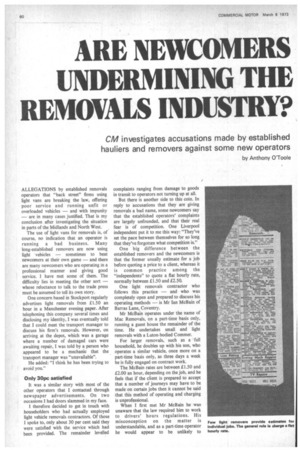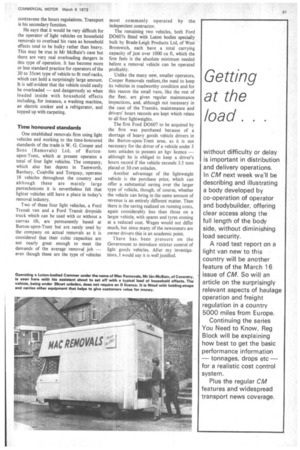ARE NEWCOMERS •
Page 62

Page 63

If you've noticed an error in this article please click here to report it so we can fix it.
UNDERMINING THE REMOVALS INDUSTRY?
CM investigates accusations made by established hauliers and removers against some new operators
by Anthony O'Toole ALLEGATIONS by established removals operators that "back street" firms using light vans are breaking the law, offering poor service and running unfit or overloaded vehicles — and with impunity — are in many cases justified. That is my conclusion after investigating the situation in parts of the Midlands and North West.
The use of light vans for removals is, of course, no indication that an operator is running a bad business. Many long-established removers are now using light vehicles — sometimes to beat newcomers at their own game — and there are many newcomers who are operating in a professional manner and giving good service. I have met some of them. The difficulty lies in meeting the other sort — whose reluctance to talk to the trade press must be assumed to tell its own story.
One concern based in Stockport regularly advertises light removals from 11.50 an hour in a Manchester evening paper. After telephoning this company several times and disclosing my identity, I was eventually told that I could meet the transport manager to discuss his firm's removals. However, on arriving at the depot, which was a garage where a number of damaged cars were awaiting repair, I was told by a person who appeared to be a mechanic that the transport manager was "unavailable".
He added: "I think he has been trying to avoid you."
Only 30pc satisfied It was a similar story with most of the other operators that I contacted through newspaper advertisements. On two occasions I had doors slammed in my face.
I therefore decided to get in touch with householders who had actually employed light vehicle removals contractors. Of those I spoke to, only about 30 per cent said they were satisfied with the service which had been provided. The remainder levelled complaints ranging from damage to goods in transit to operators not turning up at all.
But there is another side to this coin. In reply to accusations that they are giving removals a bad name, some newcomers say that the established operators' complaints are largely unfounded, and that their real fear is of competition. One Liverpool independent put it to me this way: "They've set the pace between themselves for so long that they've forgotten what competition is."
One big difference between the established removers and the newcomers is that the former usually estimate for a job before quoting a price to a client, whereas it is common practice among the "independents" to quote a flat hourly rate, normally between 11.50 and £2.50.
One light removals contractor who follows this practice — and who was completely open and prepared to discuss his operating methods — is Mr Ian McBain of Barras Lane, Coventry.
Mr McBain operates under the name of Mac Removals, on a part-time basis only, running a guest house the remainder of the time. He undertakes small and light removals with a Luton-bodied Commer.
For larger removals, such as a full household, he doubles up with his son, who operates a similar vehicle, once more on a part-time basis only, as three days a week he is fully engaged on contract work.
The McBain rates are between 11.50 and /2.00 an hour, depending on the job, and he feels that if the client is prepared to accept that a number of journeys may have to be made on certain jobs then it cannot be said that this method of operating and charging is unprofessional.
When I first met Mr McBain he was unaware that the law required him to work to drivers' hours regulations. His misconception on the matter is understandable, and as a part-time operator he would appear to be unlikely to contravene the hours regulations. Transport is his secondary function.
He says that it would be very difficult for the operator of light vehicles on household removals to overload his vans as household effects tend to be bulky rather than heavy. This may be true in Mr McBain's case but there are very real overloading dangers in this type of operation. It has become more or less standard practice for operators of the 30 to 35cwt type of vehicle to fit roof-racks, which can hold a surprisingly large amount. It is self-evident that the vehicle could easily be overloaded — and dangerously so when loaded inside with household effects including, for instance, a washing machine, an electric cooker and a refrigerator, and topped up with Carpeting.
Time honoured standards One established removals firm using light vehicles and working to the time-honoured standards of the trade is W. G. Cooper and Sons (Removals) Ltd, of Burtonupon-Trent, whith at present operates a total of four light vehicles. The company, which also has depots in Tamworth, Banbury, Coalville and Torquay, operates 18 vehicles throughout the country and although these are mainly large pantechnicons it is nevertheless felt that lighter vehicles still have a place in today's removal industry.
Two of these four light vehicles, a Ford Transit van and a Ford Transit dropside truck which can be used with or without a canvas tilt, are permanently based at Burton-upon-Trent but are rarely used by the company on actual removals as it is considered that their cubic capacities are not nearly great enough to meet the demands of the average removal job — even though these are the type of vehicles most commonly operated by the independent contractor, The remaining two vehicles, both Ford D0607s fitted with Luton bodies specially built by Brade-Leigh Products Ltd, of West Bromwich, each have a total carrying capacity of just over 1000 cu ft, which the firm feels is the absolute minimum needed before a removal vehicle can be operated profitably.
Unlike the many new, smaller operators, Cooper Removals realizes_the need to keep its vehicles in roadworthy condition and for this reason the small vans, like the rest of the fleet, are given regular maintenance inspections, and, although not necessary in the case of the Transits, maintenance and drivers' hours records are kept which relate to all four lightweights.
The first Ford D0607 to be acquired by the firm was purchased because of a shortage of heavy goods vehicle drivers in the Burton-upon-Trent area, as it is not necessary for the driver of a vehicle under 3 tons unladen to possess an hgv licence — although he is obliged to keep a driver's hours record if the vehicle exceeds 3.5 tons plated or 30 cwt unladen.
Another advantage of the lightweight vehicle is the purchase price, which can offer a substantial saving over the larger type of vehicle, though, of course, whether the vehicle can bring in the same amount of revenue is an entirely different matter. Then there is the saving realized on running costs, again considerably less than those on a larger vehicle, with spares and tyres coming at a reduced cost. Wages would not differ much, but since many of the newcomers are owner-drivers this is an academic point.
There has been pressure on the Government to introduce stricter control of light goods vehicles. After my investigations, I would say it is well justified.




















































































































































